If you are in the process of crafting a job offer letter template, you may have been referring to various examples of job offer letters. These examples can give you a general understanding of the format to follow for your own employment offer letter template.
However, it’s important to note that these generic examples may not include all the necessary information tailored to your specific needs. When drafting an offer of employment letter, you may find it necessary to incorporate specific details that are not typically found in generic example letters of the same nature.
Utilizing an employment offer letter template can be advantageous as it allows you to make minor adjustments for each new hire while still ensuring the letter remains effective. This information is crucial in clearly communicating the employee’s start date and the benefits and perks associated with the position. The offer letter sets the tone for a positive beginning of the professional relationship you aim to establish.
Table of Contents
Employment Offer Letter Templates
Employment Offer Letter Templates are invaluable tools that assist organizations in efficiently extending job offers to prospective employees. These templates provide a consistent and professional format for presenting the terms and conditions of employment, ensuring clarity and minimizing misunderstandings between the employer and the candidate. By utilizing these templates, businesses can streamline their hiring process, save time and effort, and enhance their overall recruitment strategy.
Employment Offer Letter Templates offer a consistent, efficient, and professional approach to extending job offers. By utilizing these templates, organizations can streamline their hiring process, maintain legal compliance, and effectively communicate the terms and conditions of employment to candidates. With their ability to save time and effort while promoting clarity and transparency, these templates are essential tools for businesses seeking to enhance their recruitment strategies and foster positive employee experiences from the start.
What is Job Offer Letter?

A job offer letter is a formal document that employers send to candidates who have been selected for a job position. It serves as an official offer of employment, outlining the terms and conditions of the job offer. This includes details such as the position title, job responsibilities, compensation package, start date, work schedule, and other relevant information.
The letter typically starts by specifying the position details, providing clarity on the job title, department, and reporting structure. It then proceeds to outline the compensation and benefits associated with the position. This includes details about salary or hourly rate, bonuses, commissions, as well as any additional perks or benefits offered by the employer, such as health insurance, retirement plans, and vacation time.
In addition to compensation, the job offer letter clarifies the employment terms. It specifies whether the position is full-time, part-time, temporary, or permanent. It may also mention any probationary periods, performance evaluations, or termination policies that are applicable to the role.
What’s included in a job offer letter?
A job offer letter typically includes several important components that provide details and terms of employment to the candidate. Here are the key elements commonly found in a job offer letter:
Position details: The letter specifies the job title, department, and often includes a brief description of the position, including key responsibilities and reporting structure.
Compensation: It outlines the proposed salary or hourly rate for the position, including any potential bonuses, commissions, or other forms of monetary compensation. It may also mention details about pay frequency and method (e.g., direct deposit).
Benefits and perks: The letter mentions the benefits package offered by the employer, such as health insurance, retirement plans, paid time off, parental leave, and other employee perks like gym memberships or tuition reimbursement.
Start date and work schedule: It specifies the expected start date for the candidate, indicating when they are expected to commence employment. Additionally, it may include information about the regular work hours, workdays, or shifts they are required to adhere to.
Employment terms: This section outlines the nature of employment, whether it is full-time, part-time, temporary, or permanent. It may mention any specific terms or conditions, such as a probationary period, employment contract duration, or non-disclosure agreements.
Contingencies and conditions: The letter may include any contingencies or conditions that need to be fulfilled before the job offer becomes final. These can include background checks, reference checks, drug tests, or other pre-employment requirements.
Reporting and supervisor information: It provides details about the person or position to whom the candidate will be reporting and any supervisory responsibilities they may have.
Company policies: The letter may briefly mention important company policies or procedures that the candidate should be aware of, such as code of conduct, confidentiality agreements, or intellectual property policies.
Contact information: The letter includes the contact details of the employer or hiring manager, allowing the candidate to reach out with questions or concerns related to the offer.
Acceptance instructions: The letter concludes with instructions for the candidate to formally accept the job offer, typically by signing and returning a copy of the letter or by confirming acceptance through email.
These elements collectively form a comprehensive job offer letter that provides the candidate with essential information about the employment opportunity and facilitates their decision-making process.
How to Write a Job Offer Letter
Writing a job offer letter involves careful consideration of the details and clear communication of the terms and conditions of employment. Here’s a step-by-step guide on how to write a job offer letter:
Begin with a professional tone: Use a formal and professional tone throughout the letter. Address the candidate by their full name and use appropriate salutations.
Opening paragraph: Start the letter by expressing your appreciation for the candidate’s interest in the position and briefly mention the position title and the company’s name. Congratulate the candidate on their successful selection.
Job details: Provide a clear and concise description of the position, including the job title, department, reporting structure, and key responsibilities. This helps the candidate understand their role within the organization.
Compensation and benefits: Outline the offered salary or hourly rate, including any bonuses, commissions, or performance incentives. Clearly state the frequency of pay and any other financial aspects. List the benefits package, such as health insurance, retirement plans, paid time off, and additional perks.
Start date and work schedule: Specify the expected start date for the candidate. Provide information on the regular work hours, workdays, or shifts they are expected to adhere to. Clearly mention if the position has any specific scheduling requirements.
Employment terms: Clarify the nature of employment, whether it is full-time, part-time, temporary, or permanent. Mention any probationary periods, contract durations, or conditions that apply to the position.
Contingencies and conditions: If there are any pre-employment contingencies or conditions, such as background checks or reference checks, clearly outline them in this section. State that the offer is contingent upon satisfactory completion of these checks.
Contact information: Provide the contact details of the employer or hiring manager who can address any questions or concerns the candidate may have. Include the phone number, email address, and any other relevant information.
Closing paragraph: Reiterate your excitement about the candidate joining the company. Express enthusiasm for their potential contributions and mention that you are looking forward to their response.
Formal acceptance: Include instructions for the candidate to formally accept the job offer. Specify the preferred method of acceptance, whether it’s signing and returning a copy of the letter or confirming acceptance via email. Set a deadline for their response.
Closing and signature: End the letter with a professional closing, such as “Sincerely” or “Best regards.” Sign the letter with your name, title, and the company name.
Proofread and review: Before sending the job offer letter, thoroughly proofread it for any grammatical or typographical errors. Double-check all the details and ensure clarity and accuracy in the content.
What not to include in a job offer letter
While a job offer letter should provide clear and comprehensive information about the terms and conditions of employment, there are certain things that should generally be avoided. Here are some examples of what not to include in a job offer letter:
Discriminatory language
Avoid any language or statements that may be discriminatory or biased based on factors such as race, gender, religion, age, disability, or any other protected characteristics. Focus on the candidate’s qualifications and suitability for the role.
Unreasonable expectations
Do not include unrealistic expectations or requirements that are unrelated to the position. Ensure that the expectations mentioned in the letter are reasonable and align with the responsibilities of the job.
Promises without clarity
Avoid making vague promises or commitments that cannot be clearly defined or fulfilled. Be specific and transparent about the compensation, benefits, and other aspects of employment.
Confidential or proprietary information
Refrain from including any confidential or proprietary company information in the job offer letter. Save such discussions for later stages or provide the necessary confidentiality agreements separately.
False or misleading statements
Ensure that all the information provided in the job offer letter is accurate and truthful. Avoid making false or misleading statements that could create misunderstandings or legal complications.
Arbitrary changes
Once an offer is made and accepted, it is generally not advisable to make arbitrary changes to the terms and conditions without proper justification or consultation. Avoid giving the impression that the terms mentioned in the letter are subject to arbitrary alteration.
Unprofessional or informal language
Maintain a professional tone throughout the letter. Avoid using informal language, jargon, or colloquialisms that may undermine the formality and professionalism of the offer.
Non-compliant terms
Ensure that the job offer letter complies with applicable employment laws and regulations. Avoid including terms that violate labor laws, minimum wage requirements, or any other legal obligations.
Negative or disrespectful language
Maintain a positive and respectful tone throughout the letter. Avoid any language that may be perceived as negative, disrespectful, or demeaning to the candidate.
Excessive personal information
While it’s important to provide relevant information about the position and employment terms, avoid excessive personal information that is not directly related to the job offer. Focus on the essential details without delving into unnecessary personal aspects.
Job Offer Letter Template
[Your Company’s Letterhead]
[Date]
[Candidate’s Name]
[Address]
[City, State, ZIP Code]
Dear [Candidate’s Name],
We are pleased to extend to you an offer of employment for the position of [Job Title] at [Your Company’s Name]. We were impressed by your qualifications and believe that your skills and experience make you an excellent fit for our organization.
Position Details:
Job Title: [Job Title]
Department: [Department]
Reporting to: [Supervisor/Manager]
Compensation:
Base Salary: [Salary Amount]
Bonus/Commission: [If Applicable]
Pay Frequency: [Monthly, Bi-weekly, etc.]
Other Financial Benefits: [Stock Options, Retirement Plans, etc.]
Benefits and Perks:
Health Insurance: [Details]
Retirement Plans: [401(k), Pension, etc.]
Paid Time Off: [Vacation, Sick Leave, Holidays]
Other Perks: [Gym Membership, Employee Discounts, etc.]
Start Date and Work Schedule:
Start Date: [Date]
Work Schedule: [Regular Work Hours or Shifts]
Employment Terms:
Nature of Employment: [Full-time, Part-time, Temporary, Permanent]
Probationary Period: [If Applicable]
Contract Duration: [If Applicable]
Other Terms: [Non-Disclosure Agreement, Non-Compete Clause, etc.]
Contingencies and Conditions:
[Specify any pre-employment checks, background verification, or drug testing requirements]
Please review this offer carefully and take the time to consider it. If you accept this offer, please sign and return a copy of this letter by [Deadline]. You can reach me at [Your Phone Number] or [Your Email Address] if you have any questions or require further clarification.
We are excited about the prospect of you joining our team and believe that your contributions will be invaluable to our organization. We look forward to your positive response and the beginning of a successful professional journey together.
Sincerely,
[Your Name]
[Your Title]
[Your Company’s Name]
FAQs
Is an employment offer letter legally binding?
While an employment offer letter signifies the employer’s intent to hire the candidate, it is generally not considered a legally binding contract unless it explicitly states otherwise. The terms mentioned in the letter often serve as the basis for the employment contract that is signed after the candidate accepts the offer.
Can an employment offer letter be revoked?
In some cases, an employment offer letter may be revoked if certain conditions or contingencies are not met, such as failed background checks or reference checks. However, it is generally best practice to be cautious about revoking an offer unless there are valid reasons to do so, as it can negatively impact the employer’s reputation.
Can the terms in an employment offer letter be negotiated?
Yes, the terms in an employment offer letter can be negotiated between the employer and the candidate. If the candidate wishes to negotiate certain aspects, such as salary or benefits, they can discuss their concerns or counteroffers with the employer. However, the final agreement should be documented in writing and signed by both parties.
Should an employment offer letter be signed by both parties?
It is recommended that both the employer and the candidate sign the employment offer letter to indicate their acceptance and agreement to the terms outlined. This helps establish a clear understanding between both parties and can serve as evidence in case of any disputes or misunderstandings.
What happens after the candidate accepts the employment offer?
After the candidate accepts the employment offer, they typically sign the offer letter and return a copy to the employer. This acceptance initiates the process of finalizing the employment contract, completing any remaining paperwork, and preparing for the candidate’s onboarding and start date.
How long is an employment offer letter valid?
The validity of an employment offer letter can vary depending on the employer’s policies and the specific circumstances. Typically, an offer letter has an expiration date mentioned within it, indicating the deadline by which the candidate needs to respond. If the candidate does not respond by the specified date, the offer may be considered void.
Can an employment offer letter be withdrawn?
In certain situations, an employment offer letter can be withdrawn by the employer. This may happen if there are significant changes in the company’s circumstances, budget constraints, or if the candidate does not meet the necessary conditions or contingencies mentioned in the offer letter. However, it is advisable for employers to exercise caution and consult legal counsel before withdrawing an offer to avoid potential legal implications.
Can an employer make changes to the employment offer letter after it has been accepted by the candidate?
Once an employment offer letter has been accepted by the candidate and a formal agreement has been established, it is generally not recommended for employers to make significant changes to the terms and conditions without the candidate’s consent. Alterations to the agreed-upon terms should be made through mutual agreement and with appropriate documentation.
Can an employee negotiate the terms of an employment offer letter after accepting it?
While it is common for candidates to negotiate certain terms of an employment offer before accepting it, once the offer has been accepted, it becomes a legally binding agreement. It may still be possible to negotiate minor details or aspects not explicitly mentioned in the offer letter, but both parties should approach such negotiations in good faith and come to a mutual understanding.
Is it necessary to provide a written employment offer letter, or can a verbal offer suffice?
While verbal job offers can be made, it is highly recommended to provide a written employment offer letter to the candidate. A written offer letter ensures clarity and helps to avoid misunderstandings or disputes regarding the terms of employment. It serves as an official record and provides a reference for both the employer and the employee.
Can an employment offer letter be used as an employment contract?
While an employment offer letter can serve as a preliminary agreement, it is typically not considered a comprehensive employment contract. A separate employment contract may be drafted and signed, incorporating the terms mentioned in the offer letter along with additional legally binding clauses and provisions specific to the employment relationship.










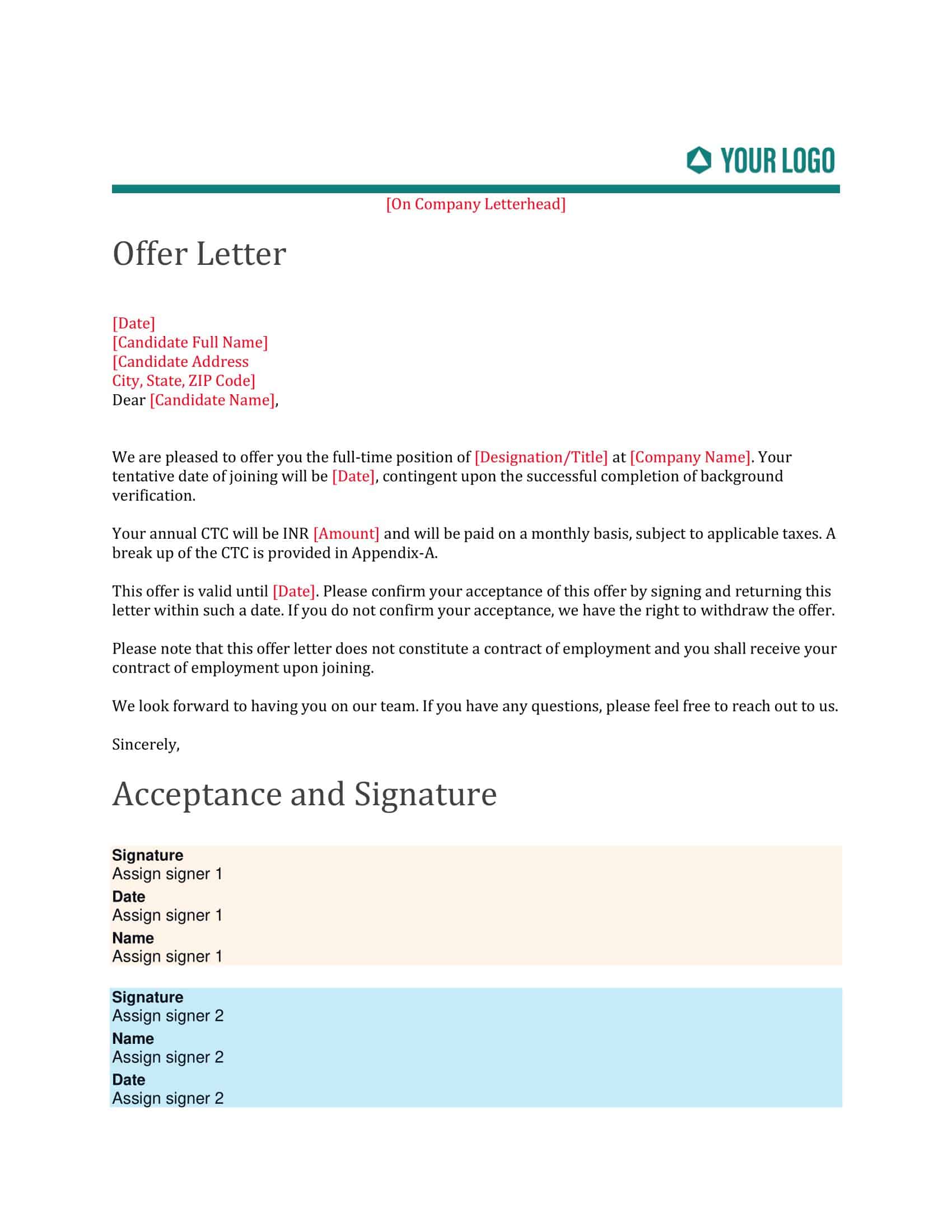
















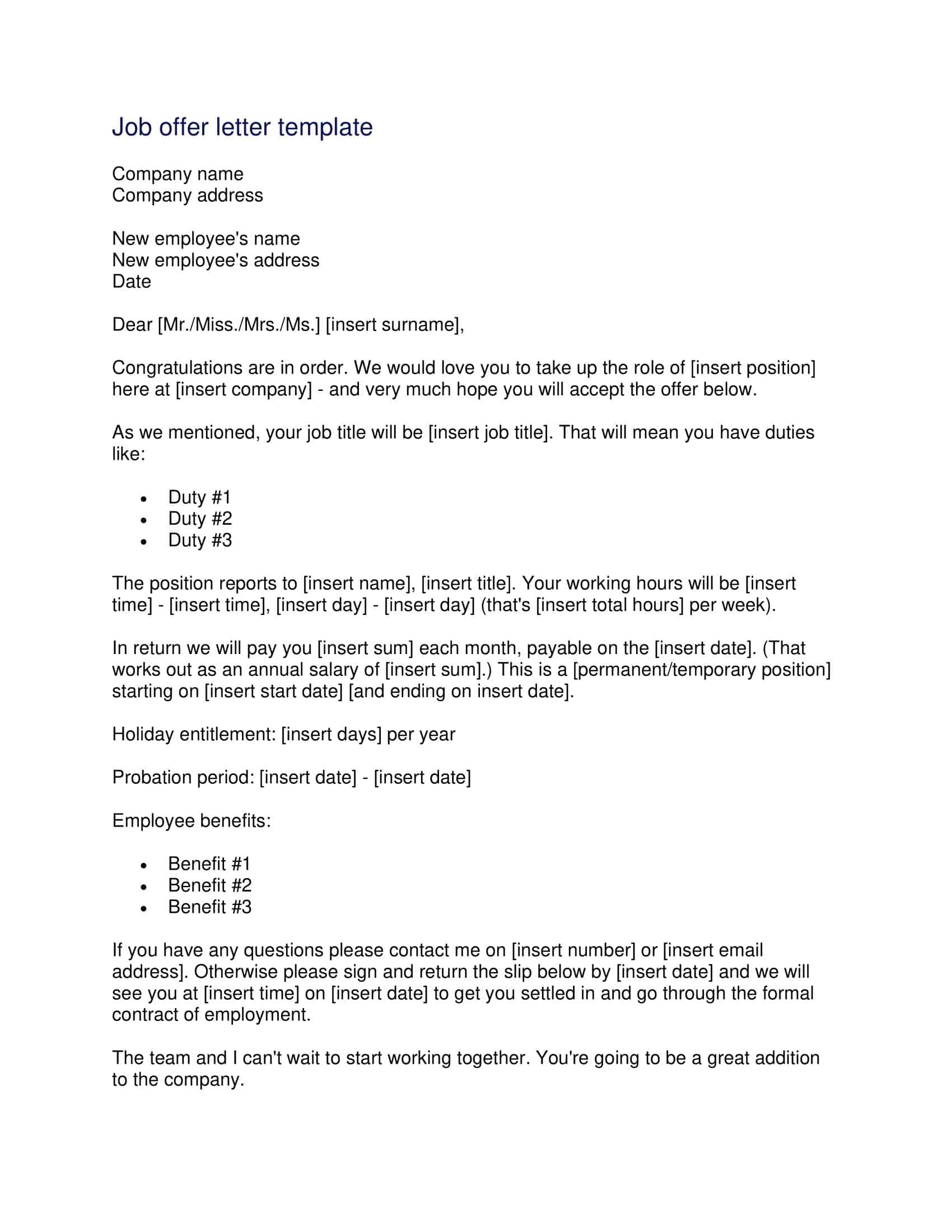




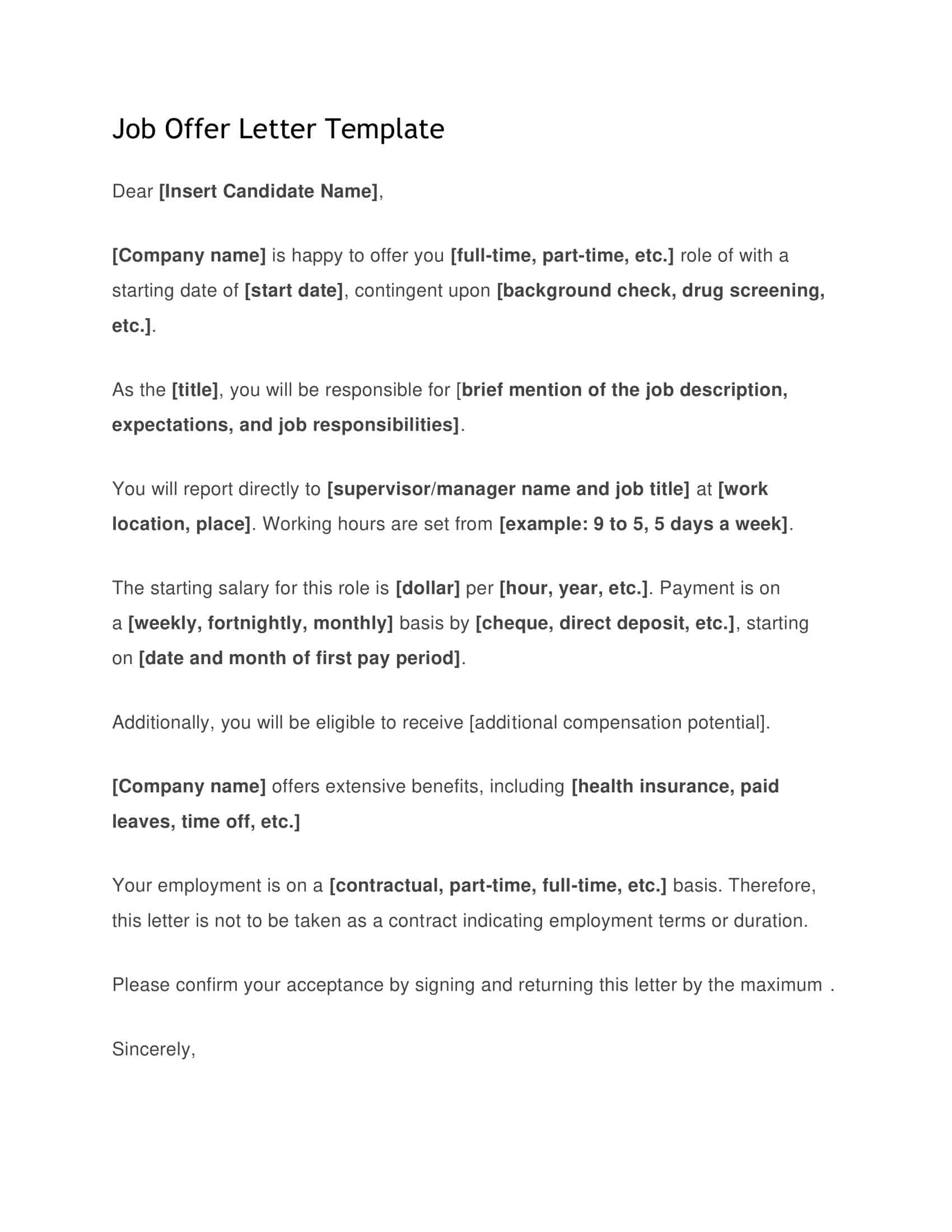





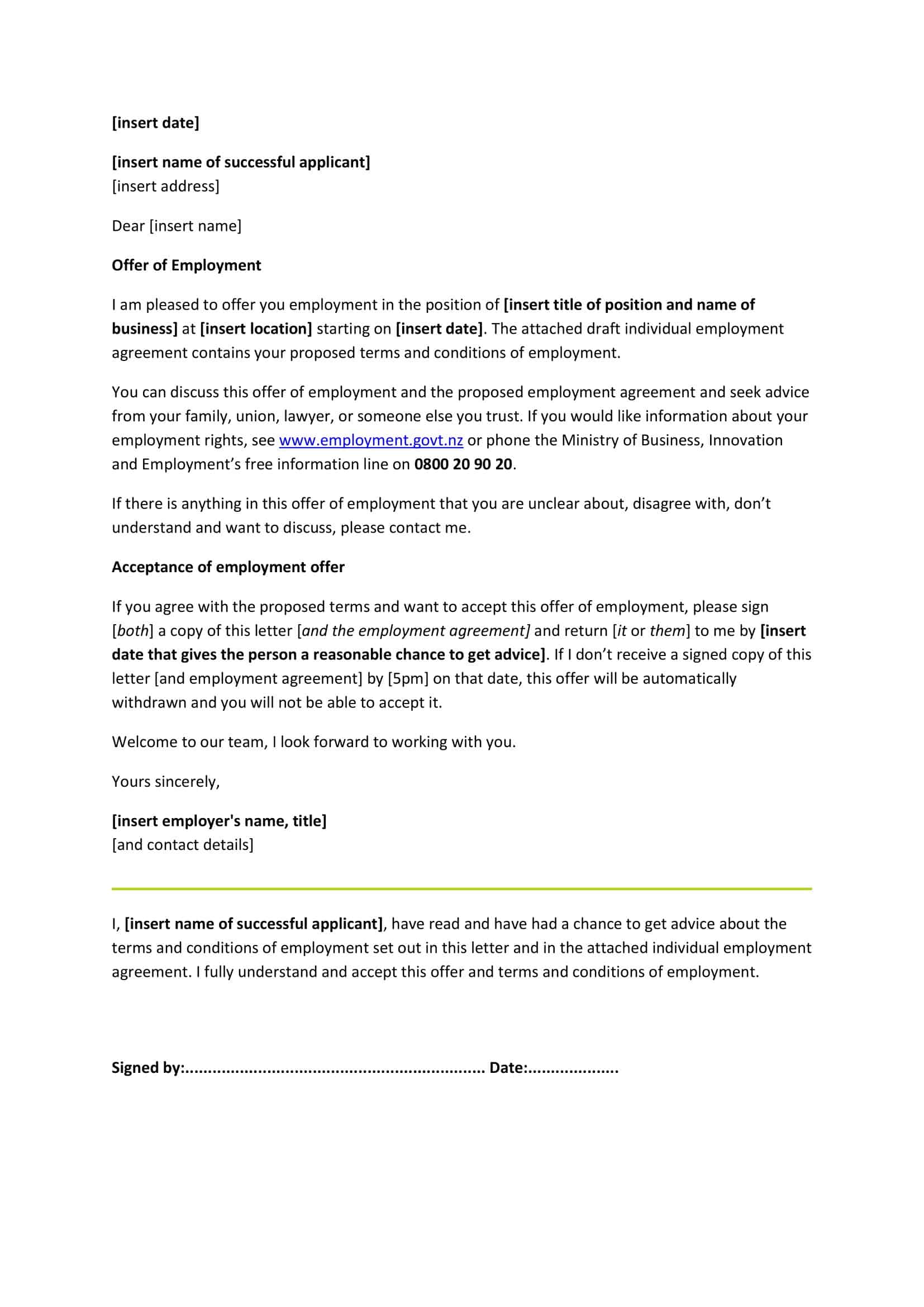
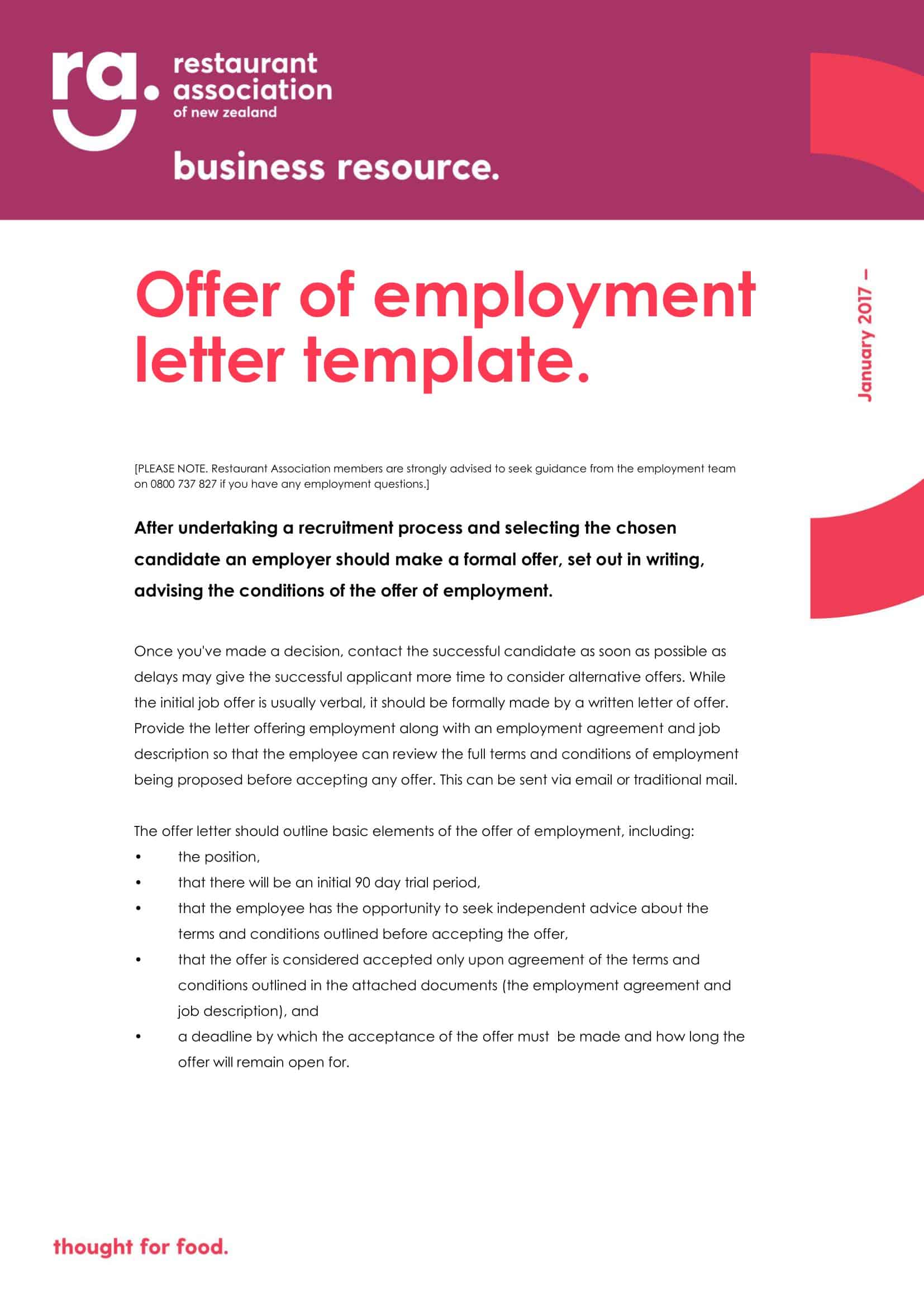



![Free Printable Friendly Letter Templates [PDF, Word, Excel] 1st, 2nd, 4th Grade 1 Friendly Letter](https://www.typecalendar.com/wp-content/uploads/2023/05/Friendly-Letter-150x150.jpg 150w, https://www.typecalendar.com/wp-content/uploads/2023/05/Friendly-Letter-1200x1200.jpg 1200w)
![43+ Printable Leave of Absence Letter (LOA) Templates [PDF, Word] / Free 2 Leave of Absence Letter](https://www.typecalendar.com/wp-content/uploads/2023/01/Leave-of-Absence-Letter-150x150.jpg 150w, https://www.typecalendar.com/wp-content/uploads/2023/01/Leave-of-Absence-Letter-1200x1200.jpg 1200w)
![Free Printable Congratulation Letter Templates [PDF, Word] Examples 3 Congratulation Letter](https://www.typecalendar.com/wp-content/uploads/2023/05/Congratulation-Letter-150x150.jpg 150w, https://www.typecalendar.com/wp-content/uploads/2023/05/Congratulation-Letter-1200x1200.jpg 1200w)
